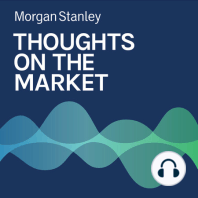3 min listen
Macro Economy: The 2024 Outlook
ratings:
Length:
9 minutes
Released:
Nov 14, 2023
Format:
Podcast episode
Description
As global growth takes a hit and inflation begins to cool, how does the road ahead look for central banks and investors? Chief Fixed Income Strategist Vishy Tirupattur hosts a roundtable with Chief Economist Seth Carpenter and Chief U.S. Equity Strategist Mike Wilson to discuss.----- Transcript -----Vishy Tirupattur: Welcome to Thoughts on the Market. I am Vishy Tirupattur, Morgan Stanley's Chief Fixed Income Strategist. Today on the podcast we'll be hosting a very special roundtable discussion on what is ahead for the global economy and markets by 2024. I am joined by my colleagues, Seth Carpenter, Global Chief Economist and Mike Wilson, Chief Investment Officer and Chief U.S. Equity Strategist. It's Monday, November 13th at 9 a.m. in New York. Vishy Tirupattur: Thanks to both of you for taking the time to talk. We have a lot to cover, so I am going to go right into it. Seth, I want to start with the global economy. As you look ahead to 2024, how do you see the global economy evolving in terms of growth, inflation and monetary policy? Seth Carpenter: Thanks, Vishy. As we look forward over the next couple of years, there are a few key themes that we're seeing in terms of growth, inflation and monetary policy. First, looks like global growth has stepped down this year relative to last year and we're expecting another modest step down in the global economy for 2024 and into 2025. Overall, what we're seeing in the developed market economies is restrictive monetary policy in general restraining growth, whereas we have much more mixed results in the emerging market world.Inflation, though, is a clear theme around the world. Overall, we see the surge in inflation. That has been a theme in global markets for the past couple of years as having peaked and starting to come down. It's coming down primarily through consumer goods, but we do see that trend continuing over the next several years. That backdrop of inflation having peaked and coming down along with weaker growth means that we're setting ourselves up for overall a bit of an easing cycle for monetary policy. We are looking for the Fed and the ECB each to start an easing cycle in June of this year. For the Fed, it's because we see growth slowing down and inflation continuing to track down along the path that we see and that the Fed will come around to seeing. I would say the stark exception to this among developed market economies is the Bank of Japan. We have seen them already get to the de facto end of yield curve control. We think by the time we get to the January policy meeting, they will completely eliminate yield curve control formally and go from negative interest rate policy to zero interest rate policy. And then over the course of the next year or so, we think we're going to see very gradual, very tentative increases in the policy rate for Japan. So for every story, there's a little bit of a cross current going on. Vishy Tirupattur: Can you talk about some of the vulnerabilities for the global economy? What worries you most about your central case, about the global economy? Seth Carpenter: We put into the outlook a downside scenario where the current challenges in China, the risks, as we've said, of a debt deflation cycle, they really take over. What this would mean is that the policy response in beijing is insufficient to overcome the underlying dynamics there as debt is coming down, as inflation is weak and those things build on themselves. Kind of a smaller version of the lost decade of Japan. We think from there we could see some of that weakness just exported around the globe. And for us, that's one of the key downside risks to the global economy. I'd say in the opposite direction, the upside risk is maybe some of the strength that we see in the United States is just more persistent than we realize. Maybe it's the case that monetary policy really hasn't done enough. And we just heard Chair Powell talk about the possibility that if inflation doesn't come down or th
Released:
Nov 14, 2023
Format:
Podcast episode
Titles in the series (100)
Mike Wilson: Are U.S. Economic Indicators Flashing Yellow? by Thoughts on the Market
